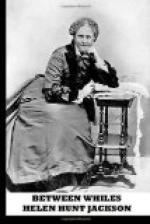“Fie, father! thou shouldst not speak ill of the clergy; it is bad luck,” said Jeanne. Jeanne was far honester of nature than either her father or her child; she was not entirely without reverence, and as far as she could, without too much inconvenience, kept good faith with her religion.
When Victorine heard that Willan Blaycke had been at the inn in their absence, she shrugged her pretty shoulders, and said, laughingly, “Eh, but that is good!”
“Why sayest thou so?” replied Jeanne. “I say it is ill.”
“And I say it is good,” retorted Victorine; and not another word could Jeanne get out of her on the matter.
Victorine was right. As Willan Blaycke rode away from the Golden Pear, he was so vexed with the unexpected disappointment that he was in a mood fit to do some desperate thing. He had tried with all his might to put Victorine’s face and voice and sweet little form out of his thoughts, but it was beyond his power. She haunted him by day and by night,—worse by night than by day,—for he dreamed continually of standing just the other side of a window-sill across which Victorine reached snowy little hands and laid them in his, and just as he was about to grasp them the vision faded, and he waked up to find himself alone. Willan Blaycke had never loved any woman. If he had,—if he had had even the least experience in the way of passionate fancies, he could have rated this impression which Victorine had produced on him for what it was worth and no more, and taking counsel of his pride have waited till the discomfort of it should have passed away. But he knew no better than to suppose that because it was so keen, so haunting, it must last forever. He was almost appalled at the condition in which he found himself. It more than equalled all the descriptions which he had read of unquenchable love. He could not eat; he could not occupy himself with any affairs: all business was tedious to him, and all society irksome. He lay awake long hours, seeing the arch black eyes and rosy cheeks and piquant little mouth; worn out by restlessness, he slept, only to see the eyes and cheeks and mouth more vividly. It was all to no purpose that he reasoned with himself,—that he asked himself sternly a hundred times a day,—
“Wilt thou take the granddaughter of Victor Dubois to be the mother of thy children? Is it not enough that thy father disgraced his name for that blood? Wilt thou do likewise?”
The only answer which came to all these questions was Victorine’s soft whisper: “Oh, if thou didst but know, sir, how I wish myself safe back in the convent!” and, “Thou seemest to me like the men of whom Sister Clarice did tell me.”
“Poor little girl!” he said; “she is of their blood, but not of their sort. Her mother was doubtless a good and pure woman, even though she had not good birth or breeding; and this child hath had good training from the Sisters in the convent. She is of a most ladylike bearing, and has a fine sense of all which is proper and becoming, else would she not so dislike the ways of an inn, and have such fear of the men that gaze on her there.”




